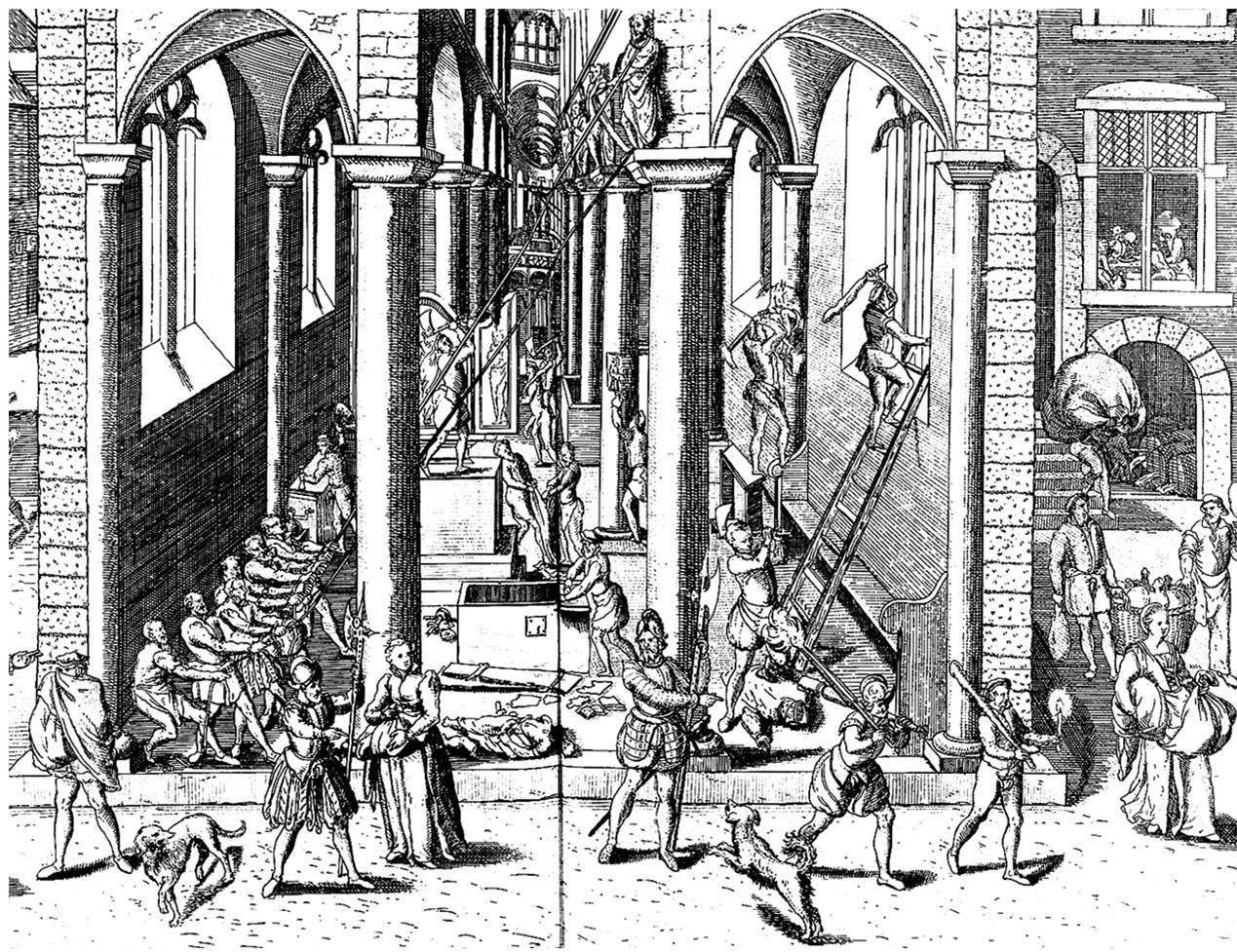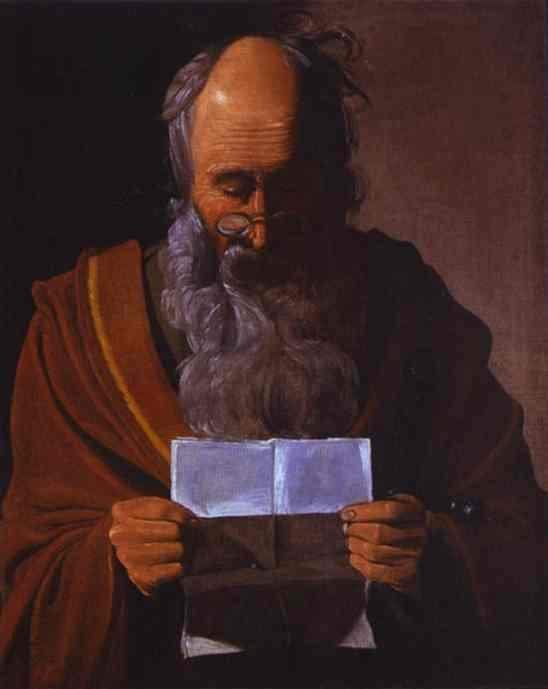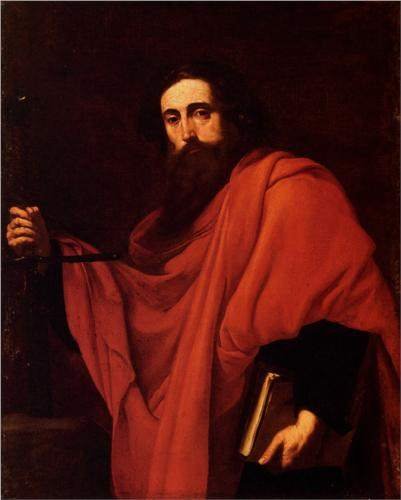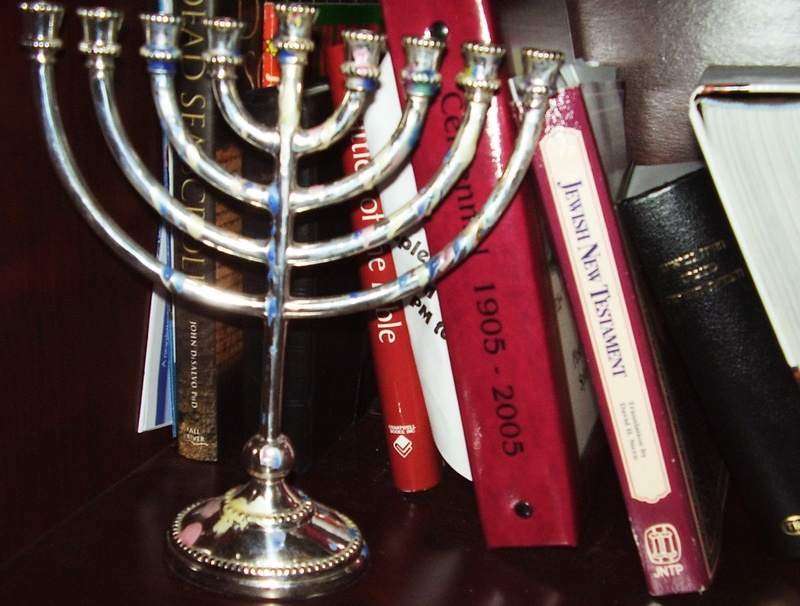(Here is a note that originated as a comment to a friend on Facebook, voicing my concerns about something I’ve never spoken about here before: “Hebrew Roots” Christianity or “Messianic Judaism.”)

I have mixed feelings about the Messianic and “Hebrew Roots” movements. (I don’t know if it’s fair to lump those together or not. I think the two have different origins, but work from similar principles.) I think it’s definitely valuable to understand the Hebrew context and roots of the Christian faith, to seek to recover valuable traditions — but at the same time, many of the people I’ve talked to tend to be anti-traditional and iconoclastic in the opposite direction, toward all established Christian tradition, both Protestant and especially Catholic.
Christianity has come down to us by way of a 2,000-year-old tradition — 2,000 years of faithful men and women who have believed and followed God and preserved and handed down the faith. And if one isn’t careful about it, this “Hebrew Roots” movement implies a renunciation of all that. It seems to be the extreme end of the attitude that was born in the Reformation: let’s go back and recover the original Christian faith; let’s find a “pure” faith, and throw away anything else that’s been added.

But I think it’s dangerous to separate faith from history and tradition. I think it was dangerous (and harmful) for the Protestant Reformers to separate the faith from so much of the tradition through which they had received it — so many babies thrown out with the dirty bathwater — and Protestants have been lacking some necessary elements ever since. The Protestant notion of sola scriptura put forward the idea that all one needs to have Christian faith is “Scripture alone,” so it’s only logical to suppose that if we strip away all the tradition, even the Protestant tradition, we’ll end up with what we were originally supposed to have. But that presumes that the Protestant idea was correct in the first place. I get the feeling that much of what is driving this movement is frustration with the disorder and fragmentation the Protestant tradition is in — it was the same frustration that has led me and many others to rediscover the Catholic Church — but that disorder ought to be an indication that something has gone wrong in the principles and premises of Protestantism, not in the whole of Christian tradition. It seems to be a foregone concluson among Protestants that the Catholic Church is a corrupt and unviable option; perhaps they should take a closer look at that before they dismiss it.

Yes, Jesus and the Apostles were Jews, and the Christian faith is the fulfillment of Hebrew prophecy and the culmination of Hebrew tradition. Yes, the earliest Christians were all Jewish and sought to preserve their Jewish identity in addition to being followers of the Messiah. But Protestants, especially those in this “Hebrew Roots” movement, presume that the historic, Catholic Church unfaithfully put aside those Jewish traditions or overwrote them with syncretistic or pagan or otherwise compromised doctrines. And separating the faith from history, presuming that Scripture is the only source one needs, makes it easy to believe that.
But the fact is that history presents a very different story. By the beginning of the second century, mere years after the deaths of the Apostles, the Christian and Jewish traditions were already parting ways. The Jews rejected Christians as anti-Jewish heretics, and Christians came to reject Jewish traditions as subversive and anti-Christian. Christian worship on the Lord’s Day (Sunday) had been a practice since the Apostles themselves (which Scripture itself supports), and the growing Church, as Christians were expelled from the synagogues, soon fell away from also celebrating Jewish worship on the Sabbath.
To sever faith from history forgets all of that and denies it happened. To cast away the Tradition of the Church loses the whole context of the New Testament and the Early Church, and with it the authentic teaching of the Apostles on how Christian worship was to be conducted. The liturgy of the Catholic Mass even to this day clearly follows the forms of the Jewish synagogue liturgy. The “Hebrew Roots” of Christianity are not lost; they merely grew into full-grown oaks.
On the other hand, “Hebrew Roots” and Messianic Judaism in fact adopt a fabricated tradition — an invention of someone or another’s subjective conception of how early Jewish Christians would have worshipped — since no authentic tradition of Judaic Christianity descends to us. It takes on a false form of ancience and tradition, and in fact “adds to the faith” as much as Protestants have ever accused Catholics of doing, only adding genuine novelty and invention rather than what they only presume to be. It tends to be based on a very Protestant reading of Scripture (it doesn’t cast away that tradition wholly), and suffers from the same basic fallacies: by ignoring the received tradition of the Church, it misses many of the crucial understandings and connections which early Christian writers and the Church Fathers realized and retained and have handed down to us. Even more troubling, I’ve encountered advocates of Christians returning to the observance of the Torah, the Jewish Law, when Scripture is quite clear that this is opposed to or even negates faith in Christ.

Scripture is clear that followers of Jesus, particularly Gentile believers, were under no obligation to observe the Torah or maintain Jewish practices, and if anything, even for Jews, these distracted from the fulfillment and revelation of Christ. The Epistle to the Hebrews tells us that God, “in speaking of a new covenant, treats the first as obsolete. And what is becoming obsolete and growing old is ready to vanish away” (Hebrews 8:13). Paul told the Colossians to “let no one pass judgment on you in questions of food and drink or with regard to a festival or a new moon or a sabbath [the principal elements of Jewish observance]. These are only a shadow of what is to come; but the substance belongs to Christ” (Colossians 2:16–17). In fact, the whole message of Paul against the heresy of the Judaizers was for Christians not to allow themselves to again be placed under the yoke of the Jewish Law, to seek justification with God through religious observance and not through faith in Christ. “You are severed from Christ, you who would be justified by the law; you have fallen away from grace” (Galatians 5:4).

Interesting parsing of a complex history. I tend to see the Gospels (and the rest of the Bible) as an essentially Jewish text. Every author of the Bible, with the exception of Luke, was a Jew. Early Christians spoke Hebrew.
It’s an essential question. Thanks for your careful parsing of it.
Thanks for the comment! Yes, it’s true that the New Testament (and certainly the Old Testament) is largely Jewish. Perhaps the majority of the Pauline Epistles, however, were written to largely Gentile audiences. Jesus and the Apostles spoke Aramaic, which was the predominant language of Palestine in the first century (we know this from many Aramaic phrases He is quoted as having said. He may have been able to read the Hebrew of the Old Testament, though many Jews read the Hebrew Scriptures through Aramaic Targumim. It’s possible that Jesus also spoke some Greek, which was the lingua franca of most of the civilized world. The New Testament texts are all written in Greek (though Matthew is reported to have also written a gospel in Hebrew; what we have in Greek may be a translation). Paul certainly spoke Greek (in addition to Aramaic) and the rest of the Apostles likely did as well — certainly they did as they went out to preach.
Joseph, I would invite your readers to listen to this sermon on the subject of the destruction of the Jerusalem temple in 70AD.
http://www.audiosancto.org/sermon/20051127-The-Destruction-of-Jerusalem-and-the-Temple-as-the-End-of-the-World.html
It sheds some light on the ceasing of authentic Old Testament worship.
As a Jew from an orthodox background fully engulfed in orthodox Messianic Judaism (for me it’s a form of Judaism that centres itself around Yeshua and the final authority of the New Testament). We know through Scripture that Messianic Jews (aka Hebrew Christians) worshiped the Triune God in a completely Jewish way. Acts tells us:
When we arrived in Jerusalem, the brethren welcomed us gladly. On the next day, Paul went in with us to Jacob; all the elders were present. After greeting them, he reported to them in detail what God had done among the Gentiles through his service. And when they heard, they began glorifying God. They said, “You see, brother, how many myriads there are among the Jewish people who have believed—and they are all zealous for the Torah. They have been told about you—that you teach all the Jewish people among the Gentiles to forsake Moses, telling them not to circumcise their children or to walk according to the customs. What’s to be done then? No doubt they will hear that you have come. “So do what we tell you. We have four men who have a vow on themselves. Take them, and purify yourself along with them and pay their expenses, so that they may shave their heads. That way, all will realize there is nothing to the things they have been told about you, but that you yourself walk in an orderly manner, keeping the Torah. “As for Gentiles who have believed, however, we have written by letter what we decided—for them to abstain from what is offered to idols, and from blood, and from what is strangled, and from immorality.” The next day Paul took the men, purifying himself along with them. He went into the Temple, announcing when the days of purification would be completed and the sacrifice would be offered for each one of them. (Acts of the Shaliachim 21:17-26 TLV)
You notice Paul (a strong voice against The Judaizing of the non Jews), was in full support in how the Jerusalem congregation was living. They were living in a way that was completely orthodox to Christianity, yet also true to their roots. They were true to the legislation of the Jerusalem council (Acts 15), while they themselves kept a distinctive Jewish identity. This is how I endeavour to live my life, completely orthodox (evangelical), yet completely Jewish.
Hi, welcome and thanks for the comment. As I think I said in the post, the problem with living a Christian life in the twenty-first century in a “completely Jewish” way is that no authentic tradition of “completely Jewish” Christianity survives to us. What you have is a Judaism twenty centuries separated from Christ, with its own distinct history and traditions and developments, read back upon the New Testament Scriptures. Your conception of being a Jew, though certainly similar, is not the same as the one Jews in the first century would have had. You can only read their writings through a modern lens and interpolate your own modern Jewish beliefs and identity where there is ambiguity — in exactly the same way that Protestants interpolate their own Protestant beliefs, similarly separated from the inherited and unbroken Tradition of the Church. Certainly, there is a lot of value in understanding the Jewish context of the New Testament, but there is nothing authentic about reconstructing a tradition that doesn’t survive. I value much more the reflections of Jews who embraced traditional Christianity, like St. Edith Stein. Thank you again for your comment. His peace be with you!
As I rebutted Robert Barron (Word on Fire Ministries, creator and presenter of Catholicism), I’ll say to you:
As one who lives by the sword (so to speak), I let it have final authority, and let it be used as a two edge sword in my life, letting it divide the things not of the Blessed Trinity from me, may I suggest you do the same thing?
Here’s another reason I’ll be part of the catholic body of the saints, but never part of the “catholic” church. In Acts 21 we read of a Messianic Jewish synagogue, and the head of said shul was Yaakov the half brother of Yeshua, offspring of Yosef and Miriam (known in Greek as Ἰάκωβος, and in English as James, however a better translation of the Greek is Jacob). This shul was anti-Judaizing, and full enforcers of the Jerusalem council (Acts 15), but continued to live, and worship as Jews, with a major difference, they were born again and Spirit filled, completely zealous for the God of Israel, indeed God almighty Himself. It is written:
Γενομένων δὲ ἡμῶν εἰς Ἱεροσόλυμα, ἀσμένως ἐδέξαντο ἡμᾶς οἱ ἀδελφοί. τῇ δὲ ἐπιούσῃ εἰσῄει ὁ Παῦλος σὺν ἡμῖν πρὸς Ἰάκωβον, πάντες τε παρεγένοντο οἱ πρεσβύτεροι. καὶ ἀσπασάμενος αὐτούς, ἐξηγεῖτο καθ’ ἓν ἕκαστον ὧν ἐποίησεν ὁ Θεὸς ἐν τοῖς ἔθνεσι διὰ τῆς διακονίας αὐτοῦ. οἱ δὲ ἀκούσαντες ἐδόξαζον τὸν Κύριον· εἶπόν τε αὐτῷ, Θεωρεῖς, ἀδελφέ, πόσαι μυριάδες εἰσὶν Ἰουδαίων τῶν πεπιστευκότων· καὶ πάντες ζηλωταὶ τοῦ νόμου ὑπάρχουσι· κατηχήθησαν δὲ περὶ σοῦ, ὅτι ἀποστασίαν διδάσκεις ἀπὸ Μωσέως τοὺς κατὰ τὰ ἔθνη πάντας Ἰουδαίους, λέγων μὴ περιτέμνειν αὐτοὺς τὰ τέκνα, μηδὲ τοῖς ἔθεσι περιπατεῖν. τί οὖν ἐστι; πάντως δεῖ πλῆθος συνελθεῖν· ἀκούσονται γὰρ ὅτι ἐλήλυθας. τοῦτο οὖν ποίησον ὅ σοι λέγομεν· εἰσὶν ἡμῖν ἄνδρες τέσσαρες εὐχὴν ἔχοντες ἐφ’ ἑαυτῶν· τούτους παραλαβὼν ἁγνίσθητι σὺν αὐτοῖς, καὶ δαπάνησον ἐπ’ αὐτοῖς, ἵνα ξυρήσωνται τὴν κεφαλήν, καὶ γνῶσι πάντες ὅτι ὧν κατήχηνται περὶ σοῦ οὐδέν ἐστιν, ἀλλὰ στοιχεῖς καὶ αὐτὸς τὸν νόμον φυλάσσων. περὶ δὲ τῶν πεπιστευκότων ἐθνῶν ἡμεῖς ἐπεστείλαμεν, κρίναντες μηδὲν τοιοῦτον τηρεῖν αὐτούς, εἰ μὴ φυλάσσεσθαι αὐτοὺς τό τε εἰδωλόθυτον καὶ τό αἷμα καὶ πνικτὸν καὶ πορνείαν. τότε ὁ Παῦλος παραλαβὼν τοὺς ἄνδρας, τῇ ἐχομένῃ ἡμέρᾳ σὺν αὐτοῖς ἁγνισθεὶς εἰσῄει εἰς τὸ ἱερόν, διαγγέλλων τὴν ἐκπλήρωσιν τῶν ἡμερῶν τοῦ ἁγνισμοῦ, ἕως οὗ προσηνέχθη ὑπὲρ ἑνὸς ἑκάστου αὐτῶν ἡ προσφορά. (ΠΡΑΞΕΙΣ ΤΩΝ ΑΠΟΣΤΟΛΩΝ 21:17-26 TR1894)
History proves that Messianic Jewish communities were in existence until the 300’s when Jews who came to faith in our Messiah were living and worshiping as Jews, completely united to the greater catholic church. We kept Shabbat, and the holiday’s, while (as Scripture attests the non Jewish churches kept Sunday). We however were united by faith, and brotherly love to our non Jewish brothers and sisters, and likewise they to us. In the 300’s however that all changed and we were forced to stop being Jewish so to speak. No more could our sons have their Brit Mila, no longer could we wear tzitzit and tefillin, no more could we enjoy Shabbat, no more could we enjoy the holiday’s, no more could we be united to our people, and our Messiah, we had to choose (something theMaster Himself, nor the Apostles ever intended). The church that Messiah founded quickly fell away from her first century foundation (that being Messiah and His Apostles), and they rejected to heed the words of Shaul of Tarsus in Romans 11, as they began to boast over Israel, and treat her with contempt. yes the start of the rise Christian anti-Semitism was on the rise, however her roots stemmed from Marcion and Ignatius (not the founder of the Jesuits), and from those roots we get the pogroms, the inquisitions (my family was kicked out of Spain), and the crusades. truly a dark era of church history. In fact it’s because of the “catholic” church (I include the “orthodox” church in this too because it’s fitting to do so) that Replacement Theology has crept into many denominations. Martin Luther (much to his displeasure) paved the way for the rebirthing of authentic Messianic Judaism (that which we see in Acts 21). in the 1800’s Joseph Rabinowitz, apart of the European Zionist movement traveled to the Holy Land and there received a revelation from God. He realized that we needed Messiah first before we needed to return to Israel. He came to faith, and was ordained a Lutheran pastor and started the first Messianic Synagogue since 309 AD. we also look back 120 years ago to the mission started by an orthodox rabbi, Leopold Cohn. He was a Hungarian Jew who was studying about the Messiah, and Messianic era, which eventually lead him to NYC, he quickly found Messiah and started a ministry that is now known as Chosen People Ministries. They do street evangelism, outreach with food, and medical, as well as have Messianic congregations. We also have the Messianic Jewish Alliance of America (it is an international fellowship under the banner IAMCS outside America), which was formerly known as the Hebrew Christian Alliance (which I’m happy to say I have family ties to), as well as we also have Jews do Jesus, the Southern Baptist Messianic Fellowship, Messiah Proclaims, Word of Messiah, the Union of Messianic Jewish Congregations, just to name a few. As a Jew I choose to live my life as such, but always staying true to the Holy Trinity. Yes I’m aware of people like “Mother” Miriam of the Lamb of God foundress of Daughters of Mary Mother of Israel’s Hope (she used to work as a missionary with Chosen People Ministries), her brother David Moss (and the Association of Hebrew Catholics), Bro. Bob Fishman, Teresa Benedicta of the cross, “Father” David Neuhaus in Israel, and Cardinal Lustinger of Paris, but they don’t deter me from the truth, and what was historically and Biblically acceptable for how Messianic Jews can faith.
I will further add, a further rebuttal to what you’ve said “Your conception of being a Jew, though certainly similar, is not the same as the one Jews in the first century would have had. You can only read their writings through a modern lens and interpolate your own modern Jewish beliefs and identity where there is ambiguity”.
Given the fact we have documents from the early Messianic Jewish Community, and clear evidence that Messianic Judaism can survive in a modern world (Messianic Judaism is one of the fastest growing forms of Judaism today, especially in Israel), this is not only an unintelligent thing to say, but it is also promoting what the early church was promoting, replacement theology (which of course you’d never call it this, but that’s what it is). I’d advise you to do a little research before you comment, as not only were you comments insulting, but uneducated as well. My concept of being a Jew, is the same concept as what Jacob the brother of Yeshua had, as well as Rabbi Leopold Cohn had, and even David Moss.
What a weak answer, Messianic congregations have been going strong since the 1800’s, and this is what is drawing Jews to our Messiah! As the need increases, the numbers of shuls will increase, and the numbers of Messianic rabbis and Messianic Jewish Evangelists. Btw, in regards to your statement about tradition, one could say the same thing about many catholic traditions as well (such as Mary ever virgin, apostolic succession, and no saying Alleluia (from the Hebrew hallelujah, which simply means Praise The Lord)). You need to think long and hard before you comment, as your rebuttal was very weak.
I am sorry, but I am not even sure I understand what you are saying. You will never be a part of the Catholic Church because… why? Because there were still Jewish Christians at and following the Council of Jerusalem? No one in the Catholic Church disputes this.
I might point out that your use of language is a case in point: The word “shul” is Yiddish, from the language of medieval European Jews, and is not a term ancient Jewish Christians would have understood at all. Many of the other terms you use, likewise, are terms from modern Judaism that were never used by ancient Christians; you use Yiddish terms even as you contradict yourself by quoting Greek texts, written by Gentiles. Your concept of being a Jew is not that of James or any other early Jewish Christian, but that of a Jew twenty centuries later attempting to recreate a lost tradition (or, I will grant, of Jews nineteen centuries later, noting Cohn and Moss). There is no authentic tradition of ancient Judaic Christianity that descends to us today. I say this not to attack your faith — to each his own — but to point out, again, that you have no valid claim to any form of “traditional” Christianity.
I have not seen any historical sources that support your claim that sects of Jewish Christians survived into the fourth century. That could be — I would like to see your evidence — but that seems historically unlikely. Seriously tensions between the Church and Judaism were already clearly evident by the end of the first century. Ignatius of Antioch testified that the Church then no longer kept the Sabbath at that time, and an anti-Semitic element was already appearing in the writings of other authors (I am not defending this or justifying it, but it was there). Irenaeus, Tertullian, Origen, Cyprian, writing in the second and third centuries, give no indications of any surviving Jewish Christian sects. From the very beginning of the Church, Jews everywhere were openly hostile to the growing Christian movement, just as they were to Jesus Himself, and to Stephen, James, Peter and Paul, and the rest of the early Church, as the book of Acts itself attests. The early councils of the Church marked growing opposition to Jewish observance in the Church. Whether right or wrong, that is what happened; and when it was Jews, more than even the Romans, who were persecuting the Church, who can blame Christians for fearing Judaic practice as something subversive?
In any case, suppose there were still communities of Jewish Christians surviving into the fourth century. That is still 1,700 years ago, and you still have the same problem: their tradition did not survive to us today. A tradition that was reinvented in the nineteenth century is still a reinvented tradition. Your “rebuttal” in fact proves my point. I apologize if I have offended you, but these are the facts.
Concerning the “Catholic” traditions you cite: these all can be demonstrated to have been a part of Christianity since the first century, and were no doubt a part of the Apostolic faith. While claiming to represent the faith of the Apostles, you are rejecting their authentic tradition in favor of modern speculations.